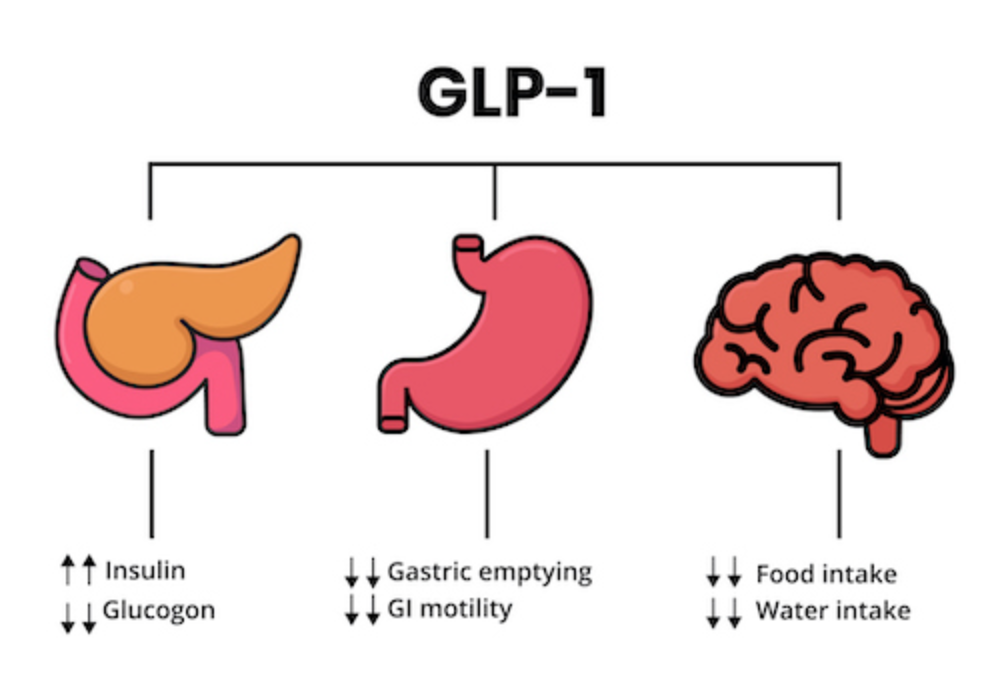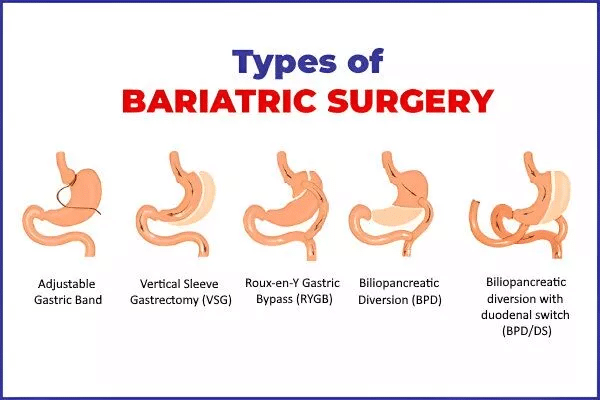
Shedding Pounds, Gaining Health: Weight Loss Medications vs. Bariatric SurgeryFor many struggling with obesity, achieving and maintaining a healthy weight can feel like an uphill battle. While lifestyle modifications like...
Shedding Pounds, Gaining Health: Weight Loss Medications vs. Bariatric Surgery
For many struggling with obesity, achieving and maintaining a healthy weight can feel like an uphill battle. While lifestyle modifications like diet and exercise are crucial, sometimes additional support is needed. This is where two powerful tools emerge: weight loss medications and bariatric surgery.
At LifeRx.md, we understand the complexities of weight management, and we're dedicated to helping you find the most effective and sustainable path to a healthier you. This article delves into the science behind weight loss medications and bariatric surgery, exploring their benefits, limitations, and how they can fit into your personalized weight loss journey.
Weight Loss Medications: A Modern Approach to Appetite Control

A new wave of weight loss medications has emerged, offering promising results for patients seeking a non-surgical solution. These medications work through various mechanisms, primarily targeting appetite control and hormonal regulation. Now, we'll explore some of the varieties you're most likely to come across:
- Glucagon-Like Peptide-1 (GLP-1) Receptor Agonists: GLP-1 is a naturally occurring gut hormone that promotes feelings of fullness and slows gastric emptying. Medications like Liraglutide (Saxenda) and Dulaglutide (Trulicity) mimic GLP-1's effects, leading to reduced calorie intake and weight loss. A 2023 study published in the New England Journal of Medicine [1] found that Liraglutide, alongside lifestyle changes, resulted in significant weight loss (an average of 8.4%) compared to a placebo group.
- Lipase Inhibitors: Orlistat (Xenical) is a medication that blocks the absorption of dietary fat in the intestine. This leads to a decrease in overall calorie intake and weight loss. However, Orlistat can cause side effects like oily stools and stomach upset.
- Serotonin-Noradrenaline Reuptake Inhibitors (SNRIs): Originally used for depression, some SNRIs, like Phentermine/Topiramate (Qsymia), have been shown to promote satiety and reduce cravings, leading to weight loss.
Benefits of Weight Loss Medications:
- Non-invasive approach: Medications offer a less drastic alternative to surgery.
- Relatively safe: When used correctly and under medical supervision, most medications have manageable side effects.
- Improved metabolic health: Studies suggest GLP-1 agonists may improve insulin sensitivity and glycemic control in patients with type 2 diabetes.
Limitations of Weight Loss Medications:
- Modest weight loss: Compared to bariatric surgery, weight loss with medications tends to be more modest, typically in the range of 5-15% of body weight.
- Long-term adherence: The effectiveness of medications relies on consistent use. If you stop taking the medication, there's a chance you might regain weight.
- Potential side effects: Depending on the medication, side effects like nausea, diarrhea, and constipation can occur.
- Cost: Many weight loss medications are not covered by insurance, making them a significant financial commitment.
Bariatric Surgery: A Surgical Intervention for Long-Term Weight Management

Bariatric surgery, also known as weight loss surgery, is a group of surgical procedures that alter the digestive system to promote weight loss. The three most common types of these surgeries are discussed below:
- Laparoscopic Sleeve Gastrectomy: This procedure restricts the stomach size by approximately 75%, creating a narrow sleeve-shaped pouch from the upper portion of the stomach. The remaining stomach tissue is removed. This reduction in stomach volume significantly reduces the amount of food a person can consume at one time, leading to increased satiety and decreased calorie intake. Additionally, the sleeve gastrectomy disrupts the production of ghrelin, a hormone that stimulates hunger. By reducing ghrelin levels, sleeve gastrectomy can help curb cravings and promote feelings of fullness.
- Laparoscopic Roux-en-Y Gastric Bypass: This surgery creates a smaller stomach pouch, typically about the size of a walnut, by stapling a portion of the stomach. This pouch is then connected directly to the small intestine, bypassing a significant portion of the stomach and the first section of the small intestine (duodenum). This rerouting of the digestive system leads to several effects that contribute to weight loss. First, the smaller stomach pouch limits food intake. Second, bypassing the duodenum reduces the absorption of nutrients from food, as bile and digestive enzymes from the pancreas normally enter the small intestine in this region. This reduced absorption leads to a calorie deficit and promotes weight loss. Additionally, the Roux-en-Y gastric bypass may alter gut hormones involved in appetite regulation, further contributing to feelings of fullness and reduced hunger.
- Laparoscopic Adjustable Gastric Band (LAG Band): This procedure involves placing an inflatable silicone band around the upper portion of the stomach, creating a small pouch above the band and a larger section below. The band is connected to a port placed under the skin in the abdomen. This port allows a saline solution to be injected into or removed from the band, adjusting its tightness and, consequently, the size of the upper stomach pouch. A smaller pouch restricts food intake and promotes satiety. The LAG Band is the only adjustable bariatric procedure, allowing for fine-tuning based on individual needs and tolerance.
Benefits of Bariatric Surgery:
- Significant and sustained weight loss: Studies show bariatric surgery can lead to a weight loss of 30-50% of total body weight, with improved long-term weight management compared to medications alone.
- Improved co-morbidities: Bariatric surgery can significantly improve or even resolve obesity-related conditions like type 2 diabetes, sleep apnea, and high blood pressure.
- Improved quality of life: Weight loss from bariatric surgery can lead to increased mobility, improved self-esteem, and a better overall quality of life.
Limitations of Bariatric Surgery:
- Surgical intervention: Bariatric surgery is a major procedure with inherent risks associated with anesthesia and surgery.
- Long-term commitment: Following surgery, patients require lifelong dietary and lifestyle changes to maintain weight loss and prevent complications.
- Potential side effects: Depending on the type of surgery, side effects like dumping syndrome (rapid movement of undigested food into the small intestine causing nausea and cramping) and nutritional deficiencies can occur. Long-term follow-up and monitoring are crucial to ensure proper nutrient absorption.
- Cost: Bariatric surgery can be expensive, though some insurance plans cover it for patients meeting specific criteria.
The Right Choice for You: A Personalized Approach

Both weight loss medications and bariatric surgery offer powerful tools for achieving weight loss and improving health. The best option for you depends on several factors, including your overall health, weight loss goals, and willingness to make lifestyle changes. Here are some key considerations:
- Body Mass Index (BMI): Generally, weight loss medications are considered for patients with a BMI of 30-35 who haven't achieved success with lifestyle modifications alone. Bariatric surgery is typically recommended for patients with a BMI of 40 or higher, or those with a BMI of 35-39 with obesity-related comorbidities.
- Medical history: Certain medical conditions may make you a better candidate for one option over the other. Consulting with your doctor and a bariatric specialist is crucial for a personalized assessment.
- Lifestyle considerations: Both medications and surgery require long-term commitment to dietary changes and exercise for optimal results.
LifeRX.md: Your Partner on Your Weight Loss Journey
At LifeRX.md, we understand that weight loss is a complex journey. We offer a comprehensive approach that combines medical expertise with personalized support. Our team of qualified professionals can help you explore all your options, including weight loss medications. We'll guide you through the decision-making process, ensuring you have the information you need to choose the approach that best aligns with your individual needs and goals.
Shedding pounds is a great start. This journey is about creating a lifestyle that promotes overall health and happiness. Let LifeRX.md be your partner on the path to a healthier, happier you.